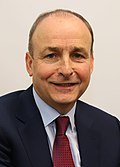| This article is part of a series within the Politics of the United Kingdom on the |
 |
|---|
Although Northern Ireland is a part of the United Kingdom, it has a quite distinct party system from the rest of the country, as the Labour Party and Liberal Democrats do not contest elections there (though the Liberal Democrats have links with the Alliance Party), and the Conservative Party has received only limited support in recent elections. Party affiliation is generally based on religious and ethnic background.
Contents
- Political parties with elected representation at a local, national, or UK level
- Party details
- Party representation
- Other registered parties
- Unionist and loyalist
- Nationalist and republican
- Others
- Unregistered parties
- Nationalist and Republican 2
- Unionist
- Inactive parties
- Unionist and loyalist 2
- Nationalist and Republican 3
- Others 2
- Flowchart of all political parties in Northern Ireland
- Party leaders
- See also
- Notes
- References
The Northern Ireland Assembly is elected by single transferable vote and the composition of the Northern Ireland Executive is by power sharing determined by the D'Hondt system, among the members elected to the assembly. Northern Ireland also elects 18 MPs to the House of Commons, and there are elections to 11 local government districts.
Some parties, such as Sinn Féin and the Workers' Party, are organised on an all-Ireland basis. Others such as the Conservative Party are organised on an all-United Kingdom basis. There are many Northern Ireland-specific parties and these, on the whole, predominate.
The distinction between "unionist/loyalist", "nationalist/republican" and "other" is not always easy with some parties and individuals. Some have defined themselves less by their position on the "Border Question" than on other political issues.
For example, the former Republican Labour Party/Social Democratic and Labour Party MP Gerry Fitt's career suggests he was first and foremost a socialist rather than a nationalist and he eventually left the SDLP claiming it had drifted from its founding intentions. Similarly the Workers' Party has its roots in the republican Official IRA but nowadays is considered to be a non-violent socialist and nationalist party. Several parties strive to be avowedly non-sectarian and would not consider themselves to be either unionist or nationalist. The Northern Ireland Assembly requires MLAs to designate themselves either "Unionist", "Nationalist" or "Other". This is a designation that is particularly resented by those who designate as "Other", as they have no input on who becomes First or Deputy First Minister.
There are some who see the terms "Unionist"/"Loyalist" and "Nationalist"/"Republican" as being of more relevance to the community that the party seeks to represent rather than the position on the border question. Several of the "Other" parties strive to be non-sectarian but have a clear position on the border.








